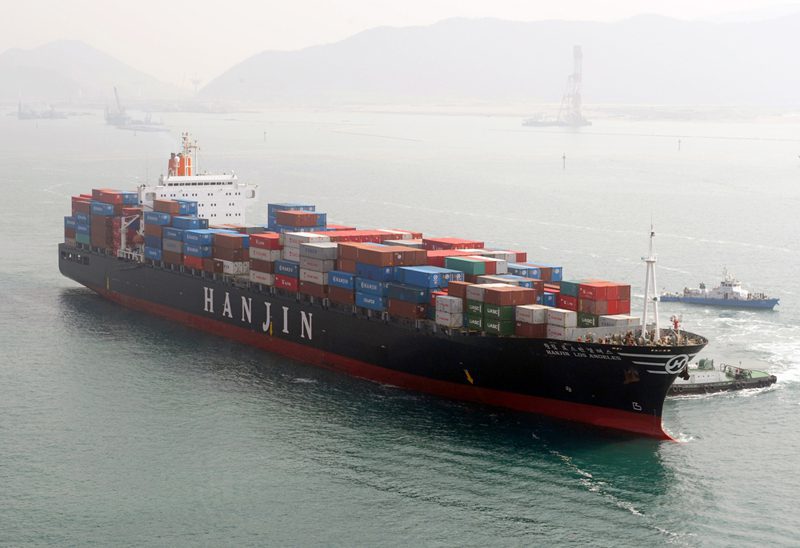Major Cocaine Bust: UK Border Force Seizes Record Shipment at London Gateway
In one of the UK’s largest drug seizures of the past decade, UK Border Force officers have seized cocaine with an estimated street value of £96 million (USD 130 million)...

Photo: Hanjin Shipping
![]()
By Jane Chung and Joyce Lee
SEOUL, Sept 8 (Reuters) – Will 80 tonnes of spicy kimchi stuck aboard three Hanjin Shipping vessels bobbing off the coast of California be unloaded before overripening? Nobody seems to know.
Around $14 billion of cargo has been stranded by the failure of the world’s seventh-biggest container carrier, with ports and lashing firms fearing they will not be paid. The havoc wrought through global trade networks threatens to take years to resolve.
Hopes that emergency money to help with unloading of cargo could soon be made available suffered a setback on Thursday when Hanjin’s lead creditor said it would be difficult to accept a court request to provide the firm with fresh funds.
The ocean freight industry has never seen a container carrier of Hanjin Shipping’s size go under before. Its collapse last week also came at the worst possible time – during the peak shipping period ahead of the year-end holiday season, stranding cargo for the likes of HP Inc and Samsung Electronics .
“For the luckiest, their cargo is already discharged in the destination port and they may be able to pay to get it released,” said Alan Murphy, chief executive of consultancy SeaIntel Maritime Analysis in Denmark.
“At worst the cargo is onboard vessels owned by Hanjin, and the discharge and delivery of cargo will be subject to lengthy legal battles between Hanjin and their creditors,” he said.
For perishable cargo like kimchi, even a few days matter.
“Kimchi can ripen fast, and if it’s too ripe when it’s unloaded, then it should all be thrown away,” said an official with a South Korean firm, who declined to identified due to the sensitivity of the matter.
The cargo was bound for Costco Wholesale Corp and Albertsons Cos Inc supermarkets before it was caught up in Hanjin’s collapse.
The court presiding over Hanjin’s receivership asked the state-backed Korea Development Bank on Wednesday for fresh funds to normalise operations but met resistance.
The bank said that while it was still considering the request, complying would raise breach of trust issues as there was no certainty that additional support would help the company survive.
Hanjin’s parent firm, Hanjin Group, has also pledged to raise 100 billion won ($90 million) in funds to help rescue cargo and government officials have said government-backed creditors would offer another 100 billion won if collateral was provided. Hanjin Group is considering the offer.
The court has, however, called those funds inadequate, also noting there was little clarity on when or if the funds would materialise.
South Korea’s government, meanwhile, plans to send more than 20 substitute container ships from next week on routes to the United States, Europe and Southeast Asia to contain the fallout.
As of Thursday, 89 of Hanjin Shipping’s 141 vessels were not operating normally, the company said. A few have been seized by creditors.
A U.S. bankruptcy court’s temporary ruling this week that protects Hanjin ships from being seized does not compel ports worried about payment to unload the ships. Courts in the United Kingdom and Japan have granted similar protection to ships run by Hanjin, which is seeking stay orders in 43 jurisdictions.
Sung Kwang Co Ltd, a small Korean textile maker, is not among the lucky cargo owners.
Three Dubai-bound containers carrying $450,000 worth of textiles – equal to nearly a quarter of its profit last year, is floating on a Hanjin ship off the coast of southern China, said Lee Wan-kyu, an official at Sung Kwang, which is scrambling to find a way to get its cargo onto another ship.
“It’s already late for delivery and getting later by the second,” he told Reuters. ($1 = 1,090.4900 won) (Additional reporting by Keith Wallis in Singapore and Se Young Lee in Seoul; Writing by Tony Munroe; Editing by Edwina Gibbs)
(c) Copyright Thomson Reuters 2016.

Sign up for gCaptain’s newsletter and never miss an update

Subscribe to gCaptain Daily and stay informed with the latest global maritime and offshore news


Stay informed with the latest maritime and offshore news, delivered daily straight to your inbox
Essential news coupled with the finest maritime content sourced from across the globe.
Sign Up